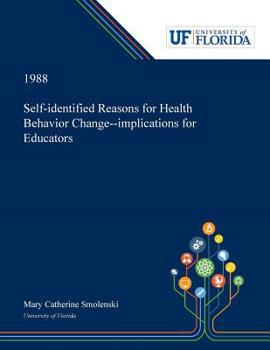Self-identified Reasons for Health Behavior Change--implications for Educators
Select Format
Select Condition 
Book Overview
Abstract: This study examined the self-identified reasons individuals perceived as helping or hindering them from making health behavior changes after a risk assessment. A corporation in the Southeastern US contracted with a community hospital to provide health risk assessment services to their employees. Forty six of these individuals, identified as being at risk were interviewed by phone eight months later with a researcher developed 12 question interview protocol. Sample included 30 males, 16 females, 59% Caucasian, with most frequent age range being 31-40. A statistical difference was found between the responses of males and females as to whether the workplace affected their health behaviors. 61% of males vs 89% of females. Overall 73% of individuals felt their place of work affected their health behavior with 47% identifying a negative effect. One third of the individuals received results they did not expect. Seventy four percent felt the assessment helped them but 50% wanted more information to correct the problems identified. Eighty percent identified someone who had an impact on their health behaviors with support as the most important method of impact. Sixty-seven percent identified events affecting their health behavior, with tragic events identified most often and the majority of events perceived as helpful (including events identified as tragic). Pride and self image were identified most frequently as helping behavior change. Health, seeing positive results, and support were identified most often as incentives for health behavior change. No respondents rated themselves as unhealthy. One of the interests of the author was locus of control and whether people are motivated internally to make changes or believe that outcomes are a result of external forces, luck, fate or controlled by others. In summary, there is considerable variability in the reasons people identify for making health behavior changes and educators (and health care providers as educators) need to recognize these individual differences when working with clients. The implications identified at the end of the study relate to educators, nurses/health care providers and for corporations/businesses, especially because of the self-identified impact work environment has on individuals. Dissertation Discovery Company and University of Florida are dedicated to making scholarly works more discoverable and accessible throughout the world. This dissertation, "Self-identified Reasons for Health Behavior Change--implications for Educators" by Mary Catherine Smolenski, was obtained from University of Florida and is being sold with permission from the author. A digital copy of this work may also be found in the university's institutional repository, IR@UF. The content of this dissertation has not been altered in any way. We have altered the formatting in order to facilitate the ease of printing and reading of the dissertation.
Format:Paperback
Language:English
ISBN:0530005700
ISBN13:9780530005706
Release Date:May 2019
Publisher:Dissertation Discovery Company
Length:220 Pages
Weight:1.15 lbs.
Dimensions:0.5" x 8.5" x 11.0"
Customer Reviews
0 rating





